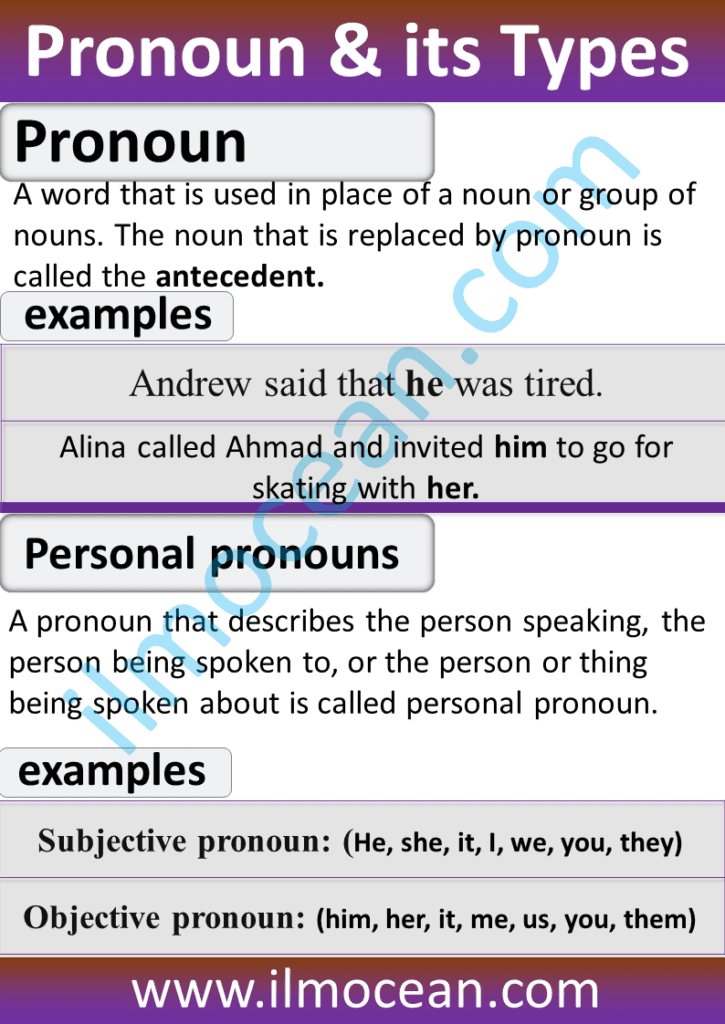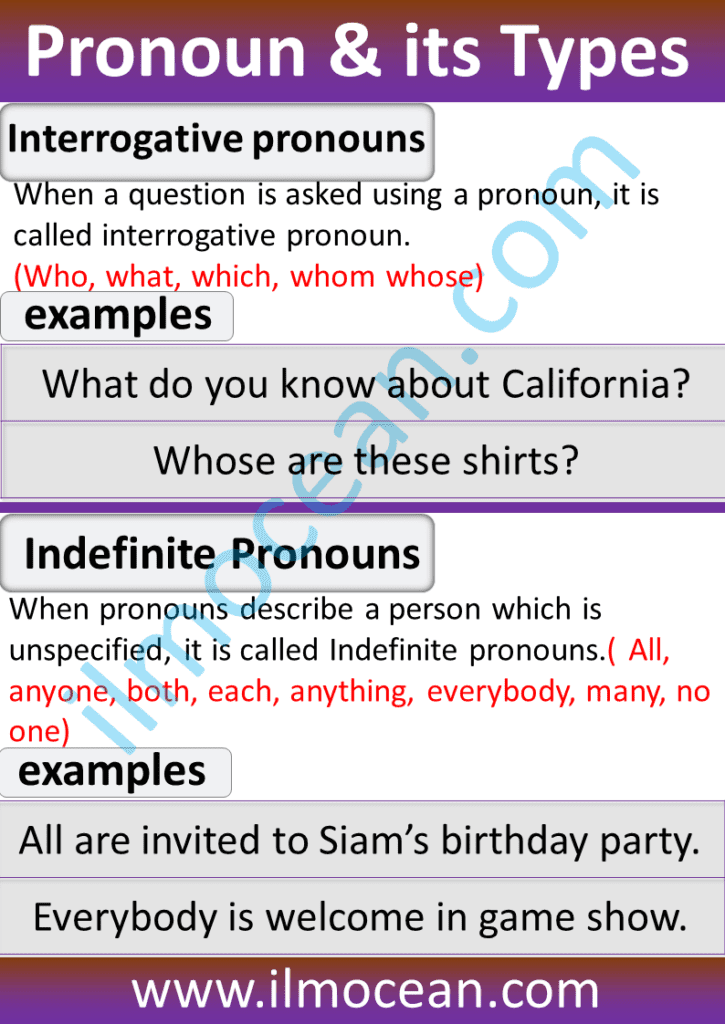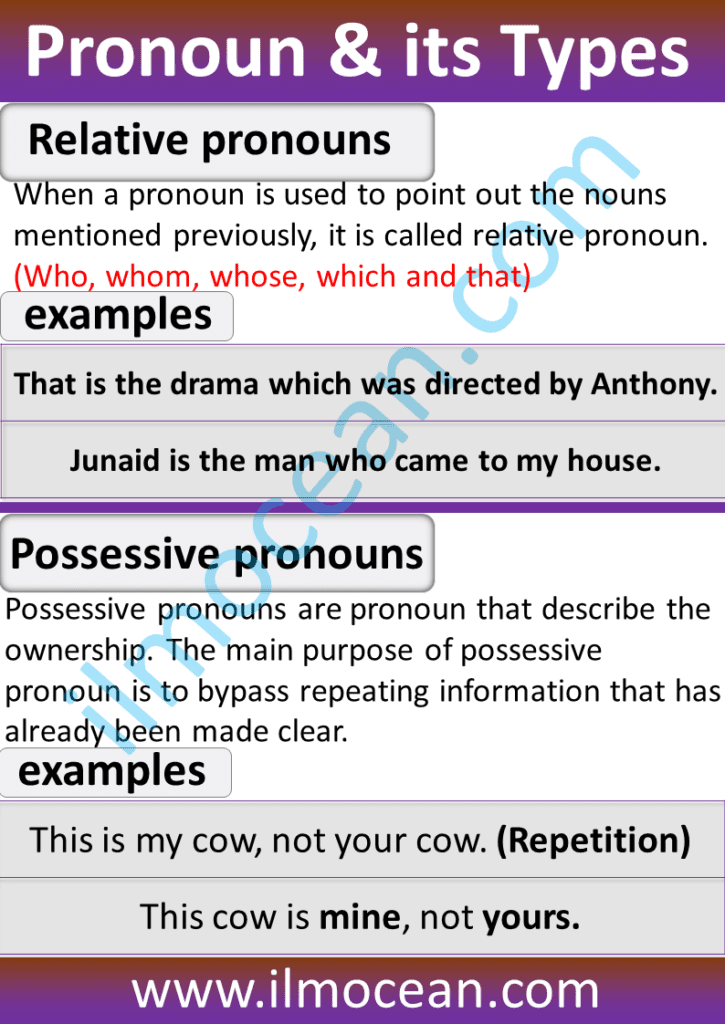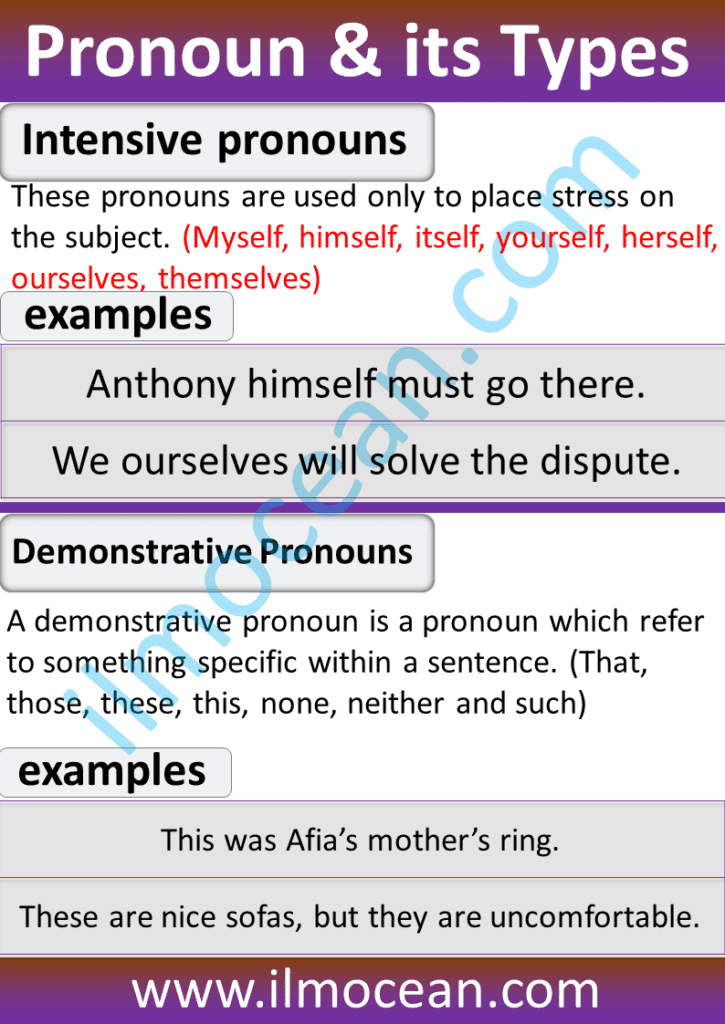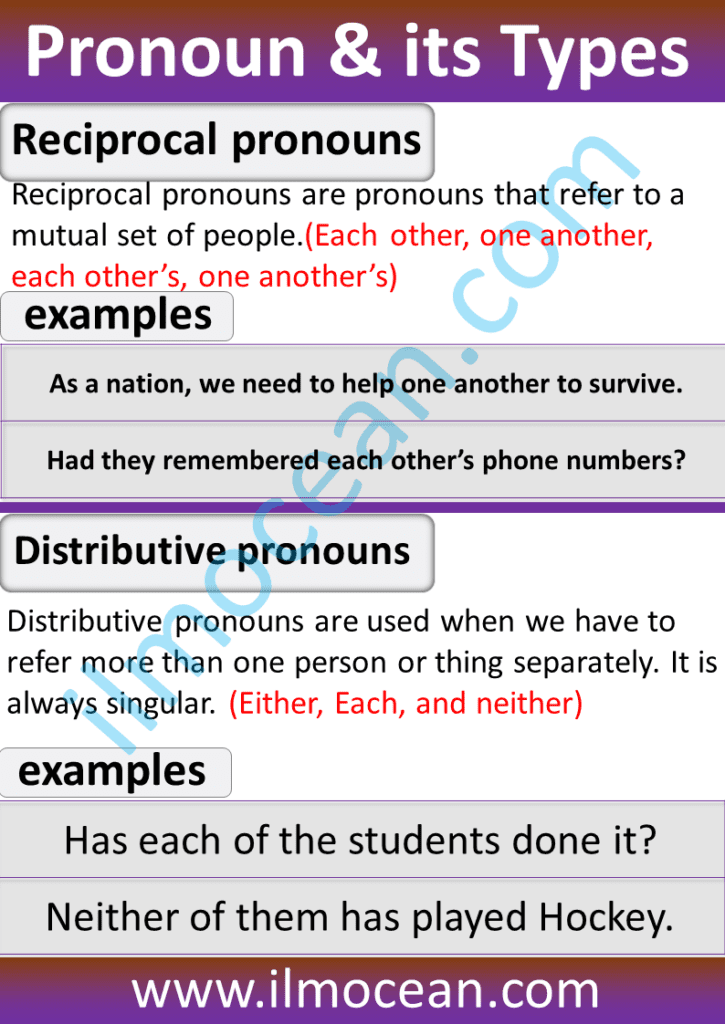Understanding the pronoun and its types is essential for clear and effective communication in English. A pronoun replaces a noun to avoid repetition and improve sentence flow. Many learners struggle with choosing the right pronoun in different contexts. In this blog post, you will learn about personal, possessive, reflexive, relative, and other pronouns with simple explanations.
What is Pronoun?
A pronoun is a word that is used in place of a noun or group of nouns. The noun or group of nouns that is replaced by pronoun is called the antecedent.
- Andrew said that he was tired.
In this example, the pronoun boy” is referring back to the noun (antecedent) “Andrew.”
- Alina called Ahmad and invited him to go for skating with
Pronouns in above sentence are” him and her” and Alina is antecedent her while Ahmad is the antecedent of him.
Alina called Ahmad and invited Ahmad to go skating with Alina. = Awkward and repetitious
Kinds of Pronoun
Personal Pronouns
A pronoun that describes the person speaking, the person being spoken to, or the person or thing being spoken about is called personal pronoun. Keep in mind that there are two types of personal pronouns: subjective and objective.
Subjective pronoun: When a pronoun acts as a subject in the sentence is called subjective pronoun. (He, she, it, I, we, you, they)
Objective pronoun: When a pronoun acts as an object in the sentence, it is called objective pronoun (him, her, it, me, us, you and them)
-
Interrogative pronouns:
When a question is asked using a pronoun, it is called interrogative pronoun.
(Who, what, which, whom whose).
The question may be a direct question, in this case, a question mark will come at the end of a sentence. It can be an indirect question also.
- What do you know about California and its population?
- Andrew asked Simon what he knew California and its population.
Note: Interrogative pronoun and interrogative adjective are different.
Interrogative pronouns refers something of which the question is being asked.
Interrogative adjectives describe or modify a noun.
- Whose are these shirts? = interrogative pronoun.
- Whose shirts are these? = interrogative adjective.
- Indefinite Pronouns:
When pronouns describe a person which is unspecified, it is called Indefinite pronouns. For example (person, place, thing, or idea.)
All, anyone, both, each, anything, everybody, many, no one, some and someone are some indefinite pronouns.
- All are invited to Siam’s birthday party.
- Everybody is welcome in game show.
- Everybody has to take an examination in order to graduate from Oxford.
- All of the seniors of Aitchison were excited about graduation.
- Relative pronouns:
When a pronoun is used to point out the nouns mentioned previously, it is called relative pronoun. It is also used to introduce a subordinate clause. (Who, whom, whose, which and that)
- That is the drama which was directed by Anthony.
- Junaid is the man who came to my house on Sunday.
Note: Keep in mind that relative pronouns and relative adjectives are different.
There are only two types of relative adjectives, which and what. These relative adjectives come with noun, usually after the noun.
- Siam didn’t tell me what he was going to wear. = Relative pronoun.
- Siam didn’t tell me what suit he was going to wear. = Relative adjective.
- Possessive pronouns:
Possessive pronouns are used to describe the ownership.
(His, hers, its, mine, ours, yours, theirs.) The main purpose of this type is to bypass repeating information that has already been made clear. These useful pronouns help us to avoid confusion and make a sentence very clear.
- This is my cow, not your cow. (Sounds repetitive)
- This cow is mine, not
- I didn’t have my camera so Zohaib lent me his camera. (Sounds repetitive)
- I didn’t have my camera, so Zohaib lent me
- Reflexive Pronoun:
Reflexive pronouns are pronouns that are used to refer back to the subject of the sentence. Reflexive pronouns act either as objects or indirect objects. (Herself, Himself, itself, myself, yourself, themselves and ourselves).
- Hina can handle the situation herself.
- People of Paris do their tasks themselves.
- Intensive pronouns:
These pronouns are used only to place stress on the subject.
Note: These pronouns are similar to reflexive pronouns, but in a sentence, they act differently. They are always placed next to the subject that they are stressing. (Myself, himself, itself, yourself, herself, ourselves, themselves).
- Anthony himself must go to the police station.
- We ourselves will solve the dispute.
- Demonstrative Pronouns:
It is a pronoun which refer to something specific within a sentence.
These pronouns are used to indicate items in space or time, and these can be either singular or plural. (That, those, these, this, none, neither and such)
- This was Afia’s mother’s ring.
- These are decent sofas, but they are uncomfortable.
How to Use Demonstrative Pronouns?
Main function of tis type is to identify nouns, whether they are named specifically or generally.
- Siam can’t believe this.
We have no idea about the word “this”.
So it is clear that demonstrative pronouns are often used to describe animals, places, or things.
- This sounds like Fariha singing.
Note: Do not mix demonstrative adjectives with demonstrative pronouns.
A demonstrative pronoun comes in place of the noun phrase in a sentence.
A demonstrative adjective always comes before a noun in the sentence.
- These are Ahmad’s shoes. (Demonstrative Pronoun)
- These shoes are his.(Demonstrative Adjective)
- Reciprocal pronouns:
These types of pronouns refer to a mutual set of people.
(Each other, one another, each other’s, one another’s).
- As a nation, we need to help one another to survive.
- Had they remembered each other’s phone numbers?
- Distributive pronouns:
Distributive pronouns are used when we have to refer more than one person or thing separately.
(Either, Each, and neither)
- Has each of the students done it?
- Has either of you done it?
- Neither of them has played Hockey.
Note: It is very important that a distributive pronoun is always singular and it take a singular noun and verb.
Download PDF here: pronoun and types
Read More
